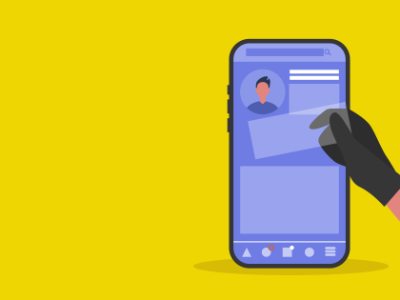Look around you right now. What do you see? If you’re sitting at your desk, you probably see your computer or tablet, maybe a few pens and pencils and a sticky note or two. We would also bet that your smartphone is sitting within arm’s reach of you.
Smartphones have become commonplace in everyday life. According to the Pew Research Center, 64 percent of American adults own a smartphone. The term “smartphone” means that your cell phone can perform the function of a regular computer, but in the palm of your hand. Smartphones make life a little easier for most people, but did you know that they also pose a huge risk? Discover why your smartphone might not be as smart as you think when it comes to identity theft.
1. Your smartphone contains sensitive information about you and your credit cards if you've ever used it to make a purchase.
When you use public Wi-Fi to make transactions, this information can be easily obtained by hackers. We’ve all seen that warning that says using a Wi-Fi network could make your data viewable by a third-party, and the truth is it can. Hackers can connect to public Wi-Fi and watch your every move, including what passwords and account information you enter while you’re connected. To stay safer, either don’t use public Wi-Fi or avoid entering private information or using apps that have passwords. It is actually more secure to use a 3G or 4G network instead.
2. Your phone can be stolen.
Whether you leave it in a public restroom or it falls out of your pocket, someone can easily take your phone. If you don’t have a passcode that prevents thieves from getting access to your personal information, it all ends up in the hands of a stranger. Create a detailed mobile security plan of attack if your smartphone is stolen or lost. For iPhone®, you can turn on Find My iPhone, which can locate and completely erase an iPhone® if necessary. Apple® users can also use the iCloud to back up important data in case of emergency. Android™ users can download Where’s My Droid in the PlayStore™, which is similar to Find My iPhone, and back up their data to Google.
3. It's harder to identify scams on a smartphone, especially when they come through emails, texts or apps.
As smart as smartphones are, many hackers are using simple phone calls to learn information about you in scams called “vishing.” These bad guys have technology that can display any name and number on your phone when they call (or sometimes text), and they most often pretend to be your bank. After gaining as much information from you as they need, they can then call your bank pretending to be you and wreak havoc on your accounts. The best practice is to never give personal information to anyone over the phone, over email or through text message.
4. Your smartphone is mobile, just like you.
Moving in and out of different networks, Wi-Fi locations and service areas creates easy access to your information. One way to prevent this is by checking your phone’s default settings and turning off any systems that you won’t use. This can seal holes that potential identity thieves could squirm through.
5. If your phone lacks any type of mobile security system, you may have viruses and hacker software gathering information about you.
Over the years it has been shown that Apple iOS is safer than Android, but that doesn’t mean your iPhone is impervious to malicious software. Smartphone apps can sometimes be the culprit of identity-stealing viruses. The Apple App Store takes strict precautionary measures to (try to) make sure that none of the apps they provide to users are infected. According to industry sources, Google’s Android store doesn’t take as many precautions as Apple. In 2012, Symantec’s Security Threat Report discovered that 95 percent of all programs that were intended to infect smartphones were made for Android users. There are several identity theft protection apps that you can download to protect your smartphone, but make sure you do your research before you select one.
Your identity is very important and should be protected. On the other hand, the world revolves around technology and being without a smartphone is generally not an option. The best way to protect yourself is by being proactive about your security.



